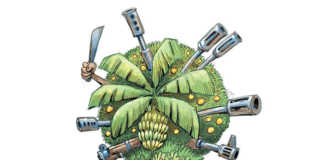The South African government has focused on empowering smallholder farmers and ensuring food security for the continent’s second-largest economy. This is commendable and the approach has certainly been proved to work in Europe, where farms have been small for centuries. In South Africa, smallholder farmers hold the key to boosting food production and creating jobs, even in communal areas. They could even go a long way towards meeting one of the goals of the National Development Plan: to employ one million people in agricuture by 2030. I suggest that small-scale farmers can make all this happen – by concentrating on five key aspects.
Mind-set change
Relying on any government to change one’s fortunes for the better is likely to mean a very long wait. In the meantime, market opportunities will be lost. The free market is a far more efficient mechanism for establishing what consumers want, and what entrepreneurs, including smallholder farmers, can produce to meet that demand. It is an instant determinant of what should be sold at the stall or in the shop. A government cannot decide this.
History is littered with failed state-controlled economies. In the 20th century alone, they led to famine in the former USSR, Ethiopia and North Korea, to name a few. The reason is simple: government officials’ response to the needs of the people is too slow. Smallholder farmers starting out, even if only on 2ha, should look to the market. What is the current demand in terms of food? Where is the food needed? When is the food needed? There has to be a shift from ‘the government must help me’ to ‘how can I help myself?’
Co-operatives
The negotiation power of a smallholder farmer is severely limited due to the scale of buying inputs, paying for transport costs and marketing the product. This problem can be overcome when a number of like-minded farmers get together and set up a co-operative with the sole aim of reducing input costs and maximising profit through a single marketing structure.
A co-operative remains the single best business structure for farmers to achieve scale of operations, whether they are smallholders or large commercial farming enterprises. Turning co-operatives into companies during the late 1990s and early 2000s was the single biggest mistake that farmers in this country made. They lost the co-op’s accountability to them, the producers, in the process.
Now shareholders, including private investors removed from agriculture, can demand higher profits and dividends at the cost of farmers. A small group of farmers located close to each other can benefit in many ways from setting up a co-op. Where a single farmer might not necessarily have enough money to buy even a small bakkie for transporting inputs or produce, a group of 20 farmers could rent a mid-size truck for the purpose. This will reduce per-unit costs. A small co-op can also buy inputs in bulk and so negotiate a lower price from suppliers, cutting costs yet again. For his part, a miller will be more interested in buying 100t of maize than 5t from a single farmer.
Crop insurance
A third pillar of smallholder sustainability is national crop insurance. One of the main risks of farming is unpredictable weather, and this inhibits many smallholder farmers from taking the next step in expanding their operations. This situation could be bridged through the introduction of compulsory crop insurance for South African farmers. As it stands now, crop insurance is prohibitively expensive due to the small number of farmers buying it.
If a larger number of farmers, both commercial and smallholder, contribute to the pool, it would naturally lead to a reduction in overall risk and cheaper premiums.Whereas the EU ensures food security through direct subsidies, South Africa’s government could achieve the same at a far lower cost through compulsory crop insurance. Government could even subsidise a portion of the insurance to reduce premiums still further.
Security of tenure
In order to expand their farming operations, smallholder farmers need to borrow money, whether from Land Bank or the country’s four large commercial banks. For this to happen, the lenders need security, usually in the form of fixed assets. The best type of security for a bank is property. In the absence of title deeds, a lender will at least have to be sure that a smallholder farmer will be allowed to farm his or her land for the foreseeable future.
Security of tenure is particularly required in traditional areas, which mirror the areas formerly designated as homelands by the apartheid government. Here, the power of traditional leaders to allocate arable land needs to be curtailed through legislation consistent with the country’s Constitution, which prohibits discrimination on the grounds of sex, religion, ethnicity and race. In particular, women need to be able to farm as freely as men on traditional lands.The goal should be to promote the expansion and eventual commercialisation of traditional land, and limits should not be placed on the areas farmed by smallholders.
Security of tenure could take the form of 99-year transferable leases to those living and working the land.
Extension services
Finally, extension services and state vets must deliver expert and efficient services to small-scale farmers. The latter should
hold government to account for this, and if it fails to deliver, there should be consequences from the department. Leadership at ministerial level is crucial for smallholder success and officials should be kept on their toes. In short, they should be expected to walk the extra mile with farmers.
In sum
If these five principles are owned by smallholder farmers and government alike, it could lead to a revolution in agriculture akin to what the country saw in the mining boom of the late 1800s. If this scale of success is attained, it might be possible to create far more than the one million jobs envisaged for agriculture by the National Development Plan, and to do so well ahead of its 2030 deadline.
Jaco Visser is the news editor at Farmer’s Weekly. He has written this article in his own capacity. Email him at [email protected].













